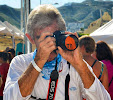Early “Bandito” stories were common, and while they didn’t discourage us from visiting Baja, they certainly heightened our awareness.
Recently, as violence has become more prevalent throughout our society, Baja has mirrored that trend with an increase in ugly incidents, particularly in the area known as “La Frontera”. According to Mexican Officials, illegal drugs and the problems associated with them seem to be the root of the problems.
Authorities on both sides of the border attempt to respond to the increased violence in different ways. Our State Department recently extended a “Traveler’s Alert” which expires April 25. It is the sixth such advisory for Mexico since 1999.
It reads in part, U.S. Citizens:
• Who believe they are being followed should notify Mexican officials as soon as possible.
• Should make every attempt to travel on main roads during daylight hours, including the toll “cuota” roads.
• Stay in the well-known tourist destinations and tourist areas of the cities that offer more adequate security.
• Provide an itinerary to a friend or family member not traveling with them. • Avoid traveling alone.
• Refrain from displaying expensive-looking jewelry, large amounts of money, or other valuable items.
Meanwhile, Mexican officials are scrambling to beef up their security throughout the region. As you travel along Mex 1, it won’t be long before you will encounter a sign indicating there is a military checkpoint ahead. These military checkpoints are designed to be the first line of defense against illegal activities. The number of checkpoints varies, but you can expect to encounter approximately six of them scattered along the highway between Tijuana and Cabo San Lucas. To get a sense of what they accomplish, check out the photos on the bulletin boards while they inspect your vehicle. Please cooperate, be patient and before you know it, you will be on your way.

Check out the photos on the bulletin boards while they inspect your vehicle
Over the years, we who drive in Baja, have developed this informal list of “do’s and don’ts” for driving the Baja roads:
• Avoid traveling through the “La Frontera” area, Tijuana through San Quintin, except in daylight hours and limit your stops to emergencies only.
• Stay on the toll roads and don't stop for any flashing lights until you get to a toll booth. (Many of the reported incidents include descriptions of bright flashing lights in the grill of the pursuing car.)
• Keep all of your necessary papers (tourist permit, current registration, Mexican insurance) in one place along with a few small bills. Don’t surrender your driver’s license or passport to anyone….period. Whenever you stop overnight, remove bags and other valuables from the car and take them inside your room.
• Limit your driving at night to emergencies only and never sleep in your rig/car along the road.
• Do not, under any circumstances, pick up hitchhikers. They not only pose a threat to your physical safety, but they also put you in danger of being arrested for unwittingly transporting narcotics in your vehicle. Be especially wary of "stranded motorists" or anyone who tries to get you to pull over.
• Never leave your vehicle with the engine running. Always lock your car and take the keys. Park in well-lighted, busy areas, if possible.
• A locking gas cap will prevent service station attendants from beginning the fueling process until you have verified that the pump has been zeroed.
• It is illegal to carry guns, knives, drugs and/or any other object that may be considered a weapon. It is also illegal to use a cellular phone while driving in the state of Baja California. You must wear your seat belt.
• Mexican Auto Insurance is a must and is available at the border before you cross into Baja.
If you run into a problem, contact Baja Tourist Assistance Hotline 078. They will direct you on how to go about filing a report with the Deputy DA Office (Ministerio Publico).
My email address is roadtrekker1@verizon.net
